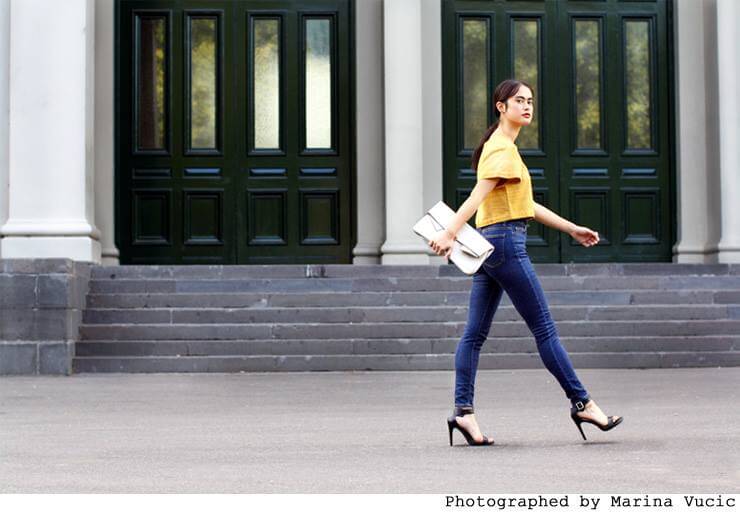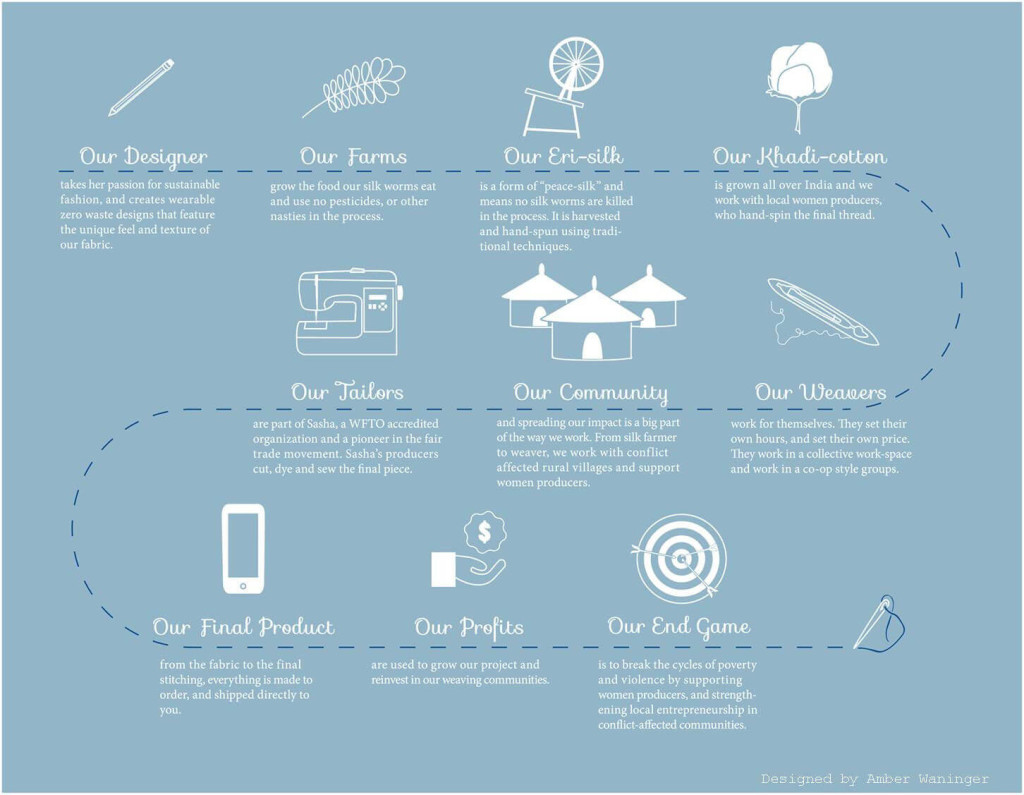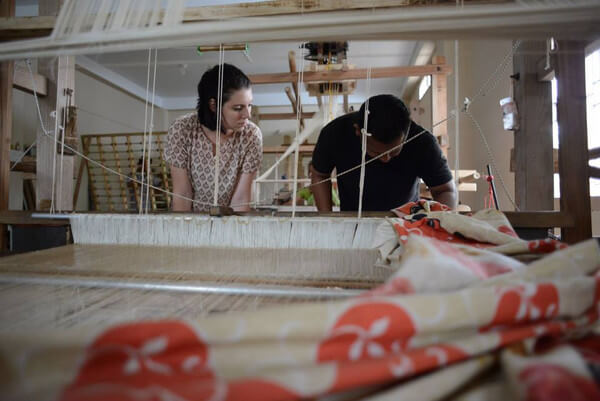
You know that at Fashionhedge we ask the tough questions. It is not rare for people to ask for a feature and then simply disappear after we send an email asking a few details about their business. Yes, it has happened a few times. We were pleasantly surprised when The Fabric Social not only replied very quickly to out inquiries, but they went above and beyond with the information offered. This was our first interaction with the company and we have no connection with anyone involved, so this was a great sign of their commitment to transparency and a true measure of how they handle the business.
The Fabric Social buys from female artisans in India affected by war and sells their pieces in the global market. The company designs the garments, places orders to the artisans and sells the product online and their motto is to create an impact in the communities they work with.
The Fabric Social is creating a slow-fashion movement that prioritizes sustainability, social responsibility and design. From cultivating the silks right through to hand looming the fabric we are supporting producers to maintain traditional practices that are environmentally sustainable and support the livelihoods of entire communities.
Katie, one of the founders answered some questions for us, here is the full interview:
Full Interview
How many people work for TFS?
Three co-founders (Katie in Perth, Fi in San Francisco, Sharna in Assam) we are 3 ladies aged 27-30, all originally from Australia. We met in Delhi around 2 years ago and we started developing The Fabric Social seriously a little over 1 year ago. We all lived and worked in Delhi as lawyers, project developers, humanitarians – in the women’s rights movement. We’ve all spent time in the Northeast before the project and lived there developing the project since.
Four volunteers all in Australia – one international development & project management consultant (who has been with us to Assam), one style & design consultant, one fashion designer, one web developer. All women, except for our web developer, he’s a dude and a childhood friend of Fi’s. All of our volunteers have been with us since the beginning) and are generally just incredible people.
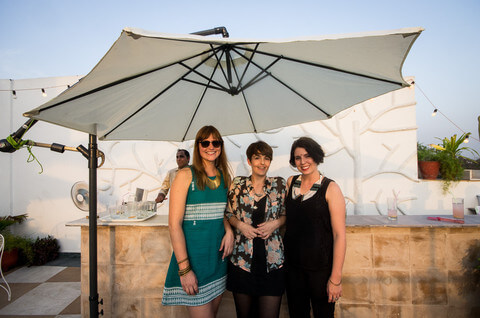
We are all about the slow fashion movement that prioritizes human rights and the environment in fashion consumerism. Our clothes take around 6 weeks from “silk worm to post box” and our line is made to order in small batches. Our fabric is made with no silkworms killed in the process, and the creation of our fabric is hand made from start to finish.
Do you just buy the fabric from these artisans or are they part of your company?
The Fabric Social doesn’t employ anyone. The artisans (all women) are self-employed and we buy fabric from them. Our artisans in Assam hand loom the fabric (eri silk and khadi cotton blend) and they set their own work hours and the price at which they want to sell the fabric. Depending on the type of fabric they loom (silk, cotton, or a blend) we purchase the fabric from the women at around 800inr per metre (this is around $16 AUD [13 USD] per metre). For your reference: our shirts are anywhere between 1 and 2.5 m per item. Depending on the skill of the artisan – some of our weavers are quicker than others especially if the younger women are learning from the older women, but usually they can loom 4-6m per day – up to 8m for a master weaver! They have other duties around the home and they loom when they can (more about this below).
What are the wages of your artisans and how do they compare to the average wage for a similar worker? How does it compare to the minimum wage?
We don’t pay wages, we pay the artisans for every metre of fabric they weave. During the seasons where it is easier to weave (dry season) the artisans make more money by weaving more fabric which we stockpile. During the monsoon season it’s difficult to keep the fabric dry and during the festival seasons it’s a time to be with family and have religious observance – so the weavers will make less fabric. It’s up to them, we try and keep a minimum amount of fabric and the women weavers will naturally weave more in the good months to supplement income for the lower production times. We leave that in their capable hands, they’ve been doing this for generations. Weaving fabric is a real community effort and commonplace for women in Assam. The entire community we work with is involved in hand rearing the silk worms, spinning the thread, harvesting the cocoons etc.. This is mostly women doing all this work. Weaving fabric especially, is always done by women.
The minimum wage in India is 169inr per day ($3.39 AUD[2.74 USD]) but having said that, two things are important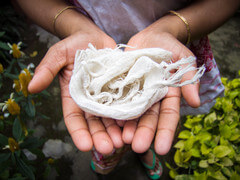
1) this is by no means a liveable wage, many human rights organisations continue to campaign for better wages, and more importantly, better working conditions which is rarely the case for workers doing minimum wage jobs in India.
2) this legal minimum is rarely adhered to by employers. For example, in Assam many (mostly) women are employed in the tea picking industry (Assam is India’s primary tea region) and these workers recently received a pay increase from 94 INR per day to 115 INR per day. This is the wage prescribed by the tea workers associations and they dictate the wages in the industry (and don’t confuse this word “association” with any workers union because it’s not, this is the official tea industry leaders).
Long story short, even if a woman in Assam manages to maintain a minimum wage job, it will not be a liveable wage. Many of the women that we work with have second jobs to make ends meet. Weaving artisans rarely, if ever, get a decent return from selling their fabric alone. They supplement with second jobs or selling other items, selling fish or vegetables etc. Women who have lost their male breadwinners to the conflict and have a family to feed are in a particularly tough situation. This hardship is common in Assam which is why women are often forced to enter economies that are not safe – such as drug trafficking, arms trafficking, and sex trafficking – simply because they can’t sustain themselves and also the ‘below poverty line’ payment given by the government is not enough to live on.
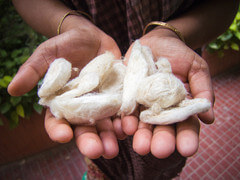
What is the profit breakdown between artisans, company management and designer?
The fabric we purchase from the weavers at around 800inr per metre. We then send the fabric to Sasha world (one of India’s first fair trade organisations – even though it’s only around 20 years old – and is the pioneer of the fair wage and fair labour movement in India). Sasha have a no factory policy and their artisans are spread out over all of West Bengal – there’s a different artisan for every process, one for hand dying the fabric, another for constructing a western t-shirt, one for block printing etc. etc.
Because we are a social enterprise we sustain solely by trade and are not funded by any government grants or aid.
The cost of getting a shirt made averages out to $36 ASD [28.3 USD] and we retail them for an average $105 AUD [84.98 USD]. We reinvest our profits into our project and we hope to expand our range into menswear and more women’s designs, but most importantly we want to take The Fabric Social model global so we can give more market opportunity to women affected by conflict in other parts of the world. Fingers crossed.
We developed a prototype iOS app that the women are using in the field to manage their small weaving enterprise.
Do all the workers have an iPhone?
We are beta testing on an iPad right now because our weaving community is small, plus the screen is bigger and easier to use. We use donated iPads and iPhones, so anyone that has a spare iPad or iPhone laying around is more than welcome to donate to us. The more iPad and iPhone we have, the more we can include women from more remote areas. The women don’t already have iPhone of course, it’s part of our mission to source donated iPads and iPhones and give them to the women to use. The purpose is so that women can use the app to run their small enterprise and connect to The Fabric Social to see how much and what kind of fabric is needed and how they will set their price depending on supply/demand.
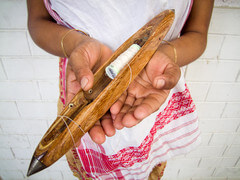 For the past two years, how have you been selling? Or what has been the main activity and how has the team paid for operational costs?
For the past two years, how have you been selling? Or what has been the main activity and how has the team paid for operational costs?
We’ve only been selling this year online. We launched our Bija Collection on Fashion Revolution day this year. This is the first time we’ve designed our own pieces and had them made for selling online. Our designer is a woman from Melbourne who has a passion for no waste design and sustainable fashion. Before we launched our range we sold other items made by our weavers to fundraise our project – things like scarves and homewares that the women weavers we already producing.
The main way we have paid for operational costs is crowdfunding! We crowdfunded about 9k from public donations from our awesome friends and family and supporters in Australia, India – and every corner of the globe. And we had such an outpouring of support that we were moved to the Pozible homepage which led to us catching the eye of PayPal who selected us as 1 of 4 projects chosen for the publically voted competition “People Rule”. PayPal selected us because of our focus on technology as part of our project and our social cause for gender equality, and so we won a lion’s share of this competition money thanks to getting the most “likes” from the public. The only reason we exist is because of our supporters who donated their hard earned cash to start us up, so we take that very seriously and we make damn sure we are accountable and transparent to them.
Why did you decide to create a “champagne brand” instead of something that can reach more people?
We think our brand can reach a lot of people, we are about affordable ethical fashion. A lot of the ethical brands retail their items for hundreds of dollars for a cotton tee-shirt. The industry is dominated by those consumers who are wealthy enough to afford ethical. We wanted to make it more accessible, we have 2 designs under $100 AUD [80.8 USD] and one design for $145 AUD [117.2 USD] . We want the work of our artisans to be valued, and we want ethical fashion to become more affordable to this generation who know that their purchasing power is political power.
To be honest, I think a lot of people associate “hand-made” with “crap” (frankly) or at least poorly put together clothing. This is where my use of the phrase “Champagne brand on a beer budget” comes in. Our clothing is constructed well, double seemed, and has incredible attention to detail – which is sometimes lacking in the hand-made industry, and let’s be honest, the sweat shop fashion industry too!
Our designer, Ally Deam, created items that are a trendy twist on wardrobe staples for western women. Our cuts are classic & bold just like our social purpose.
You don’t have to look like a Woodstock hippy just because you are buying ethical – that’s the whole idea behind our designs in a nutshell. A beautiful unique fabric, in a classic cut, in a trendy color that doesn’t scream “I JUST WENT TO INDIA AND THIS IS MY TOURIST SOUVENIR” we are all about understated chic. We aren’t that insufferable ethical brand that orders their organic gluten free bread for $20 and tells everyone about how great they are – we are about down-to-earth activism, normal people who want their value on human rights reflected in their consumer choices. Simple |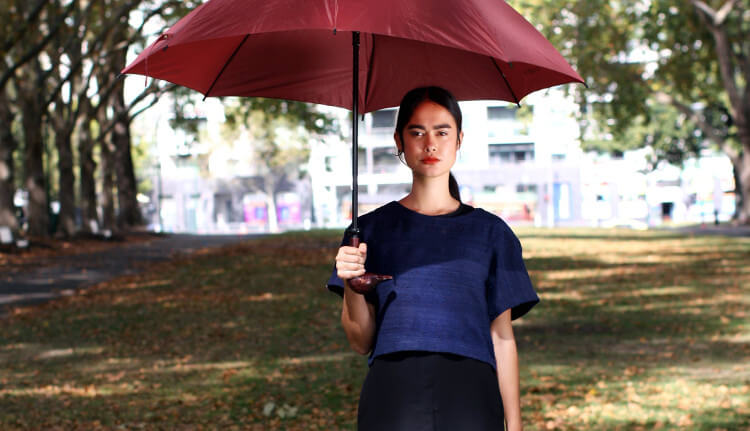
* Figures in US dollars added by editor.

